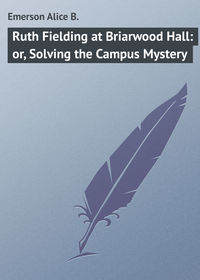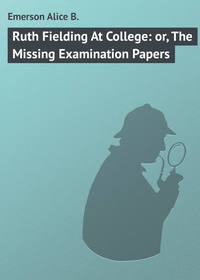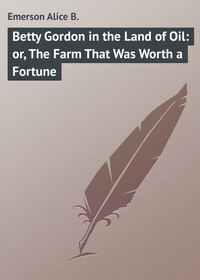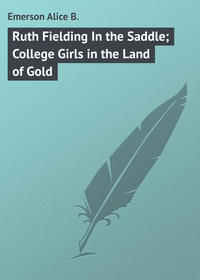 полная версия
полная версияRuth Fielding At Sunrise Farm; What Became of the Raby Orphans
“Do have a care, my son,” she said. “There has been an accident there – yes? Don’t drive too fast – ”
“By jiminy!” ejaculated Ralph Tingley. “That’s a breakdown, sure enough.”
“A farm wagon. There’s a wheel off,” cried Ann Hicks, leaning out from the other end of the seat the better to see.
“And who are all those children in blue?” demanded Mercy Curtis, looking out from below. “There’s such a lot of them! One, two, three, four, five – Goodness me! they jump about so like fleas that I can’t count them!”
“Why, I bet I know what it is,” drawled Bobbins, at last. “It’s old Caslon and his load of fresh airs. He was going to town to meet them to-day, I believe. And he’s broken down before he’s half way home with them – and serves him good and right!”
CHAPTER XIII – “THE TERRIBLE TWINS”
Ruth heard Bob’s last expression, despite the rattling of the harness and the chattering of the girls on, and in, the coach, and she was sorry. Yet, could he be blamed so much, when similar feelings were expressed daily by his own father regarding the Caslons?
Mrs. Steele was shocked as well. “My dear son!” she exclaimed, in a low voice, leaning over his shoulder. “Be careful of your tongue. Don’t say things for which you might be sorry – indeed, for which I am sure you are sorry when you stop to think.”
“Huh! Isn’t that old Caslon as mean as he can be?” demanded Bobbins.
“I am sure,” the good lady sighed, “that I wish he would agree to sell his place to your father, and so have an end of all this talk and worriment. But I am not at all sure that he hasn’t a right to do as he pleases with his own property.”
“Well – now – Mother – ”
But she stopped him with: “At any rate, you must halt and offer him help. And those children – I hope none of them has been hurt.”
“Pooh! you couldn’t hurt kids like those,” declared Bob.
But he brought the horses down to a walk and the yellow coach approached the scene of the accident at a temperate pace.
The big farm-wagon, the body of which had been filled with straw for the youngsters to ride in, had been pulled to the side of the road out of the way of passing vehicles. It was clear that the smashed wheel was past repair by any amateur means, for several spokes were broken, and the hub was split.
The youngsters whom Mr. Caslon had taken aboard at the railway station in Darrowtown were dancing about and yelling like wild Indians. As the coach came nearer, the excited party upon it could more carefully count the blue-clad figures, and it was proved that there were twelve.
Six girls were in blue gingham frocks, all alike, and all made “skimpy” and awkward looking. The six boys were in new blue overalls and cotton shirts. The overalls seemed all of one size, although the boys were not. They must have been purchased at the store of one size, and whether a boy was six, or twelve, he wore the same number.
Each of the children, too, carried a more or less neatly made up parcel, the outer covering of which was a blue and white bandanna, and the contents of which was the change of clothing the institution allowed them.
“What a terrible noise they make!” sighed Mrs. Steele. “And they are perfect little terrors, I suppose. But they are clean.”
They had not been out of the sight of the institution nurse long enough to be otherwise, for she had come as far as Darrowtown with them. But they were noisy, sure enough, for each one was trying to tell his or her mates how he or she felt when the wheel crashed and the wagon went over.
“I reckon I oughtn’t to have risked that wheel, after all,” said Mr. Caslon, doffing his hat to Mrs. Steele, but smiling broadly as he looked up from his examination of the wheel.
“Whoa, Charlie! Don’t get too near them heels, youngsters. Charlie an’ Ned are both old duffers like me; but you can’t fool around a horse’s legs without making him nervous.
“And don’t pull them reins. I don’t want ’em to start right now… Yes, ma’am. I’ll haf ter lead the horses home, and that I don’t mind. But these young ones – Now, let that whip lay right where it is, young man! That’s right.
“You see, ma’am,” he proceeded, quite calmly despite all that was going on about him, and addressing himself to Mrs. Steele, “it’s too long a walk for the little ones, and I couldn’t tote ’em all on the backs of the horses —
“Now, you two curly heads there – what do you call ’em?”
“The Terrible Twins!” quoth two or three of the other orphans, in chorus.
“I believe ye! I believe ye! They jest bile over, they do. Now, you two boys,” he added, addressing two youngsters, very much alike, about of a height, and both with short, light curly hair, “never mind tryin’ to unharness Charlie and Ned. I’ll do that.
“Ye see, ma’am, if you could take some of the little ones aboard – ” he suggested to Mrs. Steele.
The coach was well filled, yet it was not crowded. The girls began to call to the little folks to get aboard even before Mrs. Steele could speak.
“There’s lots of room up here,” cried Ruth, leaning from her end of the seat and offering her hand. The twins ran at once to climb up and fought for “first lift” by Ruth.
“Oh, yes! they can get aboard,” said Mrs. Steele. “All there is room for.”
And the twelve “fresh airs” proved very quickly that there was room for them all. Ruth had the “terrible twins” on the seat with her in half a minute, and the others swarmed into, or on top of, the coach almost as quickly.
“There now! that’s a big lift, I do declare,” said the farmer, hanging the chains of the horses’ traces upon the hames, and preparing to lead the pair along the road.
“My wife will be some surprised, I bet,” and he laughed jovially. “I’m certain sure obleeged to ye, Mis’ Steele. Neighbors ought to be neighborly, an’ you air doin’ me a good turn this time – yes, ma’am!”
“Now, you see,” growled Bob, as the four coach horses trotted on, “he’ll take advantage of this. We’ve noticed him once, and he’ll always be fresh.”
“Hush, my son!” whispered Mrs. Steele. “Little pitchers have big ears.”
“Huh!” exclaimed one of the wriggling twins, looking up at the lady sideways like a bird. “I know what that means. We’re little pitchers – Dickie an’ me. We’ve heard that before – ain’t we, Dickie?”
“Yep,” announced his brother, nodding wisely.
These two were certainly wise little scamps! Willie did most of the talking, but whatever he said his brother agreed to. Dickie being so chary with speech, possibly his brother felt that he must exercise his own tongue the more, for he chattered away like a veritable magpie, turning now and then to demand:
“Ain’t that so, Dickie?”
“Yep,” vouchsafed the echo, and, thus championed, Willie would rattle on again.
Yes. They was all from the same asylum. There were lots more of boys and girls in that same place. But only twelve could get to go to this place where they were going. They knew boys that went to Mr. Caslon’s last year.
“Don’t we, Dickie?”
“Yep.”
No. They didn’t have a mama or papa. Never had had any. But they had a sister. She was a big girl and had gone away from the asylum. Some time, when they were big enough, they were going to run away from the asylum and find her.
“Ain’t we, Dickie?”
“Yep.”
Whether the other ten “fresh airs” were as funny and cute as the “terrible twins,” or not, Ruth Fielding did not know, but both she and Mrs. Steele were vastly amused by them, and continued to be so all the way to the old homestead under the hill where the children had come to spend a part of the summer with Mr. and Mrs. Caslon.
CHAPTER XIV – “WHY! OF COURSE!”
“I hope you told that Caslon woman, Mother, to keep those brats from boiling over upon our premises,” said Mr. Steele, cheerfully, at dinner that evening, when the story of the day’s adventures was pretty well told.
“Really, John, I had no time. Such a crowd of eels – Well! whatever she may deserve,” said Mrs. Steele, shaking her head, “I am sure she does not deserve the trouble those fresh air children will bring her. And she – she seems like such a nice old lady.”
“Who’s a nice old lady?” demanded her husband, from the other end of the long table, rather sharply.
“Farmer Caslon’s wife.”
“Humph! I don’t know what she is; I know what he is, however. No doubt of that. He’s the most unreasonable – ”
“Well, they’ll have their hands full with all those young ones,” laughed Madge Steele, breaking in upon her father, perhaps because she did not wish him to reveal any further to her guests his ideas upon this topic.
“What under the sun can they do it for?” demanded Lluella Fairfax.
“Just think of troubling one’s self with a parcel of ill-bred children like those orphanage kids,” added Belle Tingley.
“Oh, they do it just to bother the neighbors, of course,” growled Bobbins, who naturally believed all his father said, or thought, to be just right.
“They take a world of trouble on themselves, then, to spite their neighbors,” laughed Mercy Curtis, in her sharp way. “That’s cutting one’s nose off to spite one’s face, sure enough!”
“Goodness only knows why they do it,” began Madge, when Ruth, who could keep in no longer, now the topic had become generally discussed among the young people, exclaimed:
“Both the farmer and his wife look to be very kindly and jolly sort of people. I am sure they have no idea of troubling other folk with the children they take to board. They must be, I think, very charitable, as well as very fond of children.”
“Trust Ruth for seeing the best side of it,” laughed Heavy.
“And the right side, too, I bet,” murmured Tom Cameron.
“We’ll hope so,” said Mr. Steele, rather grimly. “But if Caslon lets them trespass on my land, he’ll hear about it, sharp and plenty!”
Now, it so happened, that not twenty-four hours had passed before the presence of the “fresh air kids” was felt upon the sacred premises of Sunrise Farm. It was very hot that next day, and the girls remained in the shade, or played a desultory game of tennis, or two, or knocked the croquet balls around a bit, refusing to go tramping through the woods with the boys to a pond where it was said the fish would bite.
“So do the mosquitoes – I know them,” said Mercy Curtis, when the boys started. “Be honest about it, now; I bet you get ten mosquito bites to every fish-bite. Tell us when you get back.”
Late in the afternoon the rural mail carrier was due and Ruth, Helen, Madge and Heavy started for the gate on the main road where the Steeles had their letter box.
A little woolly dog ran after Madge – her mother’s pet. “Come on, Toodles!” she said, and then all four girls started to race with Toodles down to the gate.
Suddenly Toodles spied something more entertaining to bark at and caper about than the girls’ skirts. A cat was slipping through the bushes beside the wall, evidently on the trail of some unconscious bird. Toodles, uttering a glad “yap, yap, yap!” started for the cat.
Two tousled, curly heads appeared at the gateway. Below the uncapped heads were two thin bodies just of a size, clothed in shirts and overalls of blue.
“Hello, kiddies!” said Heavy. “How did you get here?”
“On our feet – didn’t we, Dickie?” responded Master Willie.
“Yep,” said Dickie.
“Oh, dear me! Toodles will hurt that cat!” cried Madge. “One of you boys run and save her – save kitty!” she begged.
But as the youngsters started off as per direction, the cat turned savagely upon Toodles. She snarled like a wildcat, leaped for his fur-covered back, and laid in with her claws in a way that made the pup yell with fright and pain.
“Oh, never mind the cat! Help Toodles! Help Toodles!” wailed Madge, seeing her pet in such dire trouble.
The youngsters stopped with disgust, as Toodles went kiting up the hill, yelping.
“Pshaw!” exclaimed Willie. “Toodles don’t need helpin’. Did’ye ever see such a dog? What he needs is a nurse – don’t he, Dickie?”
“Yep,” declared the oracular Dickie, with emphasis.
Heavy dropped down on the grass and rolled. As the cat had quickly returned from the chase, Madge and Helen joined her. It was too funny. The “terrible twins” were just slipping out of the gate, when Ruth called to them.
“Don’t go yet, boys. Are you having a good time?”
“We ain’t allowed in here,” said Willie.
“Who told you so?”
“The short, fat man with the squinty eyes and the cane,” declared Willie, in a matter of fact way.
“Short – fat – squinty – My goodness! I wonder if he can mean my father?” exclaimed Madge, inclined to be offended.
“But you can stand there and talk with us,” said Ruth, strolling toward the boys. “So you are having a nice time at Mr. Caslon’s?”
“Bully – ain’t we, Dickie?”
“Yep,” agreed the echo.
“And you won’t be glad to go back to the orphanage when you have to leave here?”
“Say, who ever was glad to go to a ’sylum?” demanded Willie, with scorn.
“And you can’t remember any other home, either of you?” asked Ruth, with pity.
“Huh! we ’member just the same things. Our ages is just alike, they be,” said Willie, with scorn.
“They have you there, Ruth,” chuckled Heavy.
Ruth Fielding was really interested in the two youngsters. “And you are all alone in the world?” she pursued.
“Nope. We gotter sister.”
“Oh! so you said.”
“And it’s so, too. She used ter be at the ’sylum,” explained Willie. “But they sent her off to live with somebody. And we was tried out by a lady and a gentleman, too; but we was too much work for the lady. We made too much extry washin’,” said Willie, solemnly.
“My goodness me!” exclaimed Ruth, suddenly. “What are your names?”
“I’m Willie; he’s Dickie.”
“But Willie and Dickie what?” demanded the startled Ruth.
“No, ma’am. It ain’t that. It’s Raby,” declared the youngster, coolly. “And our sister, she’s Sadie Raby. She’s awful smart and some day, she told us, she’s goin’ to come an’ steal us from the ‘sylum, and then we’ll all live together and keep house.”
“Will you hear this, Helen?” demanded Ruth, eagerly, to her chum who had run to her.
“Why, of course! we might have known as much, if we had been smart. These are the twins Sadie told you about. And we never guessed!”
CHAPTER XV – THE TEMPEST
Ruth was much interested in the fresh air children, and so was Helen. They found time to walk down to the Caslon farm and become acquainted with the entire twelve. Naturally, the “terrible twins” held their attention more than the others, for it did seem so strange that the little brothers of Sadie Raby should come across Ruth’s path in just this way.
Of course, in getting so well acquainted with the children, Ruth and her chum were bound to know the farmer and his wife better. They were very plain, “homey” sort of people, just as Ruth had guessed, and it appeared that they were not blessed with an over-abundance of ready money. Few farmers in Mr. Caslon’s circumstances are.
What means they had, they joyfully divided with the youngsters they had taken to board. The Caslons had no living children; indeed, the two they had had, years ago, died while they were yet babies. This Mrs. Caslon confided to Ruth.
“It left an empty place in our hearts,” she said, softly, “that nothing but other little children can fill. John has missed them fully as much as I have. Yes; he lets these little harum-scarums pull him around, and climb all over him, and interfere with his work, and take up his time a good deal. Yes, I know the place looks a sight, inside the house and out, when they go away.
“But for a few weeks every year we have a host of young things about us, and it keeps our hearts young. The bother of ’em, and the trouble of ’em, is nothing to the good they do us both. Ah, yes!
“Yes, I’ve often thought of keeping one or two of them for good. There’s a-many pretty ones, or cunning ones, we’d like to have had. But then – think of the disappointment of the rest of the darlings!
“And it would have narrowed down our sympathy – mine and John’s,” proceeded Mrs. Caslon, shaking her head gently. “We’d have centered all our love and longin’ into them we took for keeps, just as we centered all our interest in the two little ones God lent us for a little while, long ago.
“Havin’ a number of ’em each year, and almost always different ones, has been better, I guess – better for all hands. It keeps John and me interested more, and we try to make them so happy here that each poor, unfortunate orphan will go away and remember his or her summer here for the rest of their lives.
“And they do have so little to be happy over, these orphans – and it takes so very little to make them happy.
“If I had money – much money,” continued the farmer’s wife, clasping her hands, fervently, “I’d move many orphan asylums, and such like, out of the close, hot cities, where the little ones are cramped for room and air, and put each of them on a farm – a great, big farm. City’s no place for children to grow up – ’specially those that have no fathers and mothers.
“You can’t tell me but that these young ones miss their parents less here on this farm than they do back in the brick building they live in most of the year,” concluded the good woman, earnestly.
Ruth quite fell in love with the old lady – who did not appear so very old, after all. Perhaps she had kept her heart young in serving these “fresh air” orphans, year after year. And Mr. Caslon seemed a very happy, jolly sort of man, too.
The two girls stole away quite frequently to watch the youngsters play, or to teach them new means of entertaining themselves, or to talk with the farmer’s wife. But they did not wish the other girls, and the Steeles, to know where they went on these occasions.
Their host, who was the nicest kind of a man in every other way, seemed determined to look upon Caslon as his enemy; and Mr. Steele was ready to do anything he could to oust the old couple from their home.
“Pshaw! a man like Caslon can make a good living anywhere,” Mr. Steele declared. “His crops just grow for him. He’s an A-1 farmer – I’d like to find as good a one before next year, to superintend my whole place. He’s just holding out for a big price for his farm, that’s all he’s doing. These hayseeds are money-mad, anyway. I haven’t offered him enough for his old farm, that’s all.”
Ruth doubted if this were true. The Caslon place was one of the oldest homesteads in that part of the State, and the house had been built by a Caslon. Mr. Steele could not appreciate the fact that there was a sentiment attached to the farmer’s occupancy of his old home.
The Caslons had taken root here on this side-hill. The farmer and his wife were the last of the name; they had nobody to will it to. But they loved every acre of the farm, and the city man’s money did not look good enough to them.
Ruth Fielding hungered to straighten out the tangle. She wished she might make Mr. Steele understand the old farmer’s attitude. Was there not, too, some way of settling the controversy in a way satisfactory to both parties?
Meanwhile the merry party of young folk at Sunrise Farm was busy every waking hour. There were picnics, and fishing parties, and games, and walks, and of course riding galore, for Mr. Steele had plenty of horses.
Ruth and Helen privately worked up some interest among the girls and boys visiting the farm, in a celebration on the Fourth for the fresh air children. Ruth had learned that the farmer had purchased some cheap fireworks and the like for the entertainment of the orphans; but Ruth and her chum wanted to add to his modest preparations.
Ten dollars was raised, and Tom Cameron took charge of the fund. He was to ride into town the afternoon before the Fourth to make the purchases, but just about as he was to start, a thunderstorm came up.
Mr. Steele, who was a nervous man, forbade any riding or driving with that threatening cloud advancing over the hills. The lightning played sharply along the edges of the cloud and the thunder rolled ominously.
“You youngsters don’t know what a tempest is like here in the hills,” said Mr. Steele. “Into the house – all of you. Take that horse and cart back to the stables, Jackson. If Tom wants to go to town, he’ll have to wait until the shower is over – or go to-morrow.”
“All right, sir,” agreed young Cameron, cheerfully. “Just as you say.”
“Are all those girls inside?” sharply demanded Mr. Steele. “I thought I saw the flutter of a petticoat in the shrubbery yonder.”
“I’ll see,” said Tom, running indoors.
Nervous Mr. Steele thought he saw somebody there behind the bushes, before he heard from Tom. It had already begun to rain in big drops, and suddenly there was a flash of lightning and a report seemingly right overhead.
The host turned up his coat collar, thrust his cap over his ears, and ran out across the lawn toward the path behind the shrubbery. It led to a summer house on the side lawn, but this was a frail shelter from such a tempest as this that was breaking over the hill.
Mr. Steele saw the flutter of a skirt ahead, and dashed along the path, the rain pelting him as he ran.
“Come back here! Come to the house, you foolish girl!” he cried, and popped into the summer house just as the clouds seemed to open above and the rain descend in a flood.
It was so dark, and Mr. Steele was so blinded for a moment, that he could scarcely see the figure of whom he was in search. Then he beheld a girl crouching in a corner, with her hands over her ears to shut out the roar of the thunder and her eyes tightly closed to shut out the lightning.
“For mercy’s sake! get up and come into the house. This place will be all a-flood in a minute,” he gasped.
Suddenly, as he dragged the girl to her feet by one shoulder, he saw that she was not one of the house party at all. She was a frail, shrinking girl, in very dirty clothing, and her face and hands were scratched and dirty, too. A regular ragamuffin she appeared.
“Why – why, where did you come from?” demanded Mr. Steele.
The girl only stuttered and stammered, looking at him fearfully.
“Come on! never mind who you are,” he sputtered. “This is no place for you in this tempest. Come into the house!”
He set out on a run again for the front veranda, dragging her after him. The girl did not cry, although she was certainly badly frightened by the storm.
They reached the door of the big house, saturated. Here Mr. Steele turned to her again.
“Who are you? What are you doing around here, anyway?” he demanded.
“Ain’t – ain’t this the place where they got a bunch of fresh air kids?” asked the girl.
“What?” gasped Mr. Steele. “I should say not! Are you one of those young ones Caslon has taken to board to the annoyance of the whole neighborhood? Ha! what were you doing trespassing on my land?”
“I ain’t neither!” returned the girl, pulling away her hand. “You lemme be.”
“I forbade any of you to come up here – ”
“I ain’t neither,” reiterated the girl. “An’ I don’t know what you mean. I jest got there. And I’m lookin’ for the place where the fresh air kids stay.”
In the midst of this the door was drawn open and Mrs. Steele and some of the girls appeared.
“Do come in, Father,” she cried. “Why! you’re soaking wet. And that child! bring her in, whoever she is. Oh!”
Another flash of lightning made them all cower – all but Ruth Fielding, who had crept forward to look over Mrs. Steele’s shoulder. Now she dashed out and seized the bedrabbled looking stranger by the hand.
“Why, Sadie Raby! who’d ever expect to see you here? Come in! do let her come in out of the storm, Mrs. Steele. I know who she is,” begged Ruth.
CHAPTER XVI – THE RUNAWAY
Madge said, in something like perplexity: “You do pick up the strangest acquaintances, Ruth Fielding. She really does, Ma. But that has always been Ruth’s way.”
Mrs. Steele was first disturbed over her husband’s condition. “Go right away and change into dry garments – do, Father,” she urged. “You will get your death of cold standing there. And shut the door. Oh! that lightning!”
They had to wait for the thunder to roll away before they could hear her again, although Mr. Steele hurried upstairs without another glance at the bedrabbled child he had brought in out of the storm.









